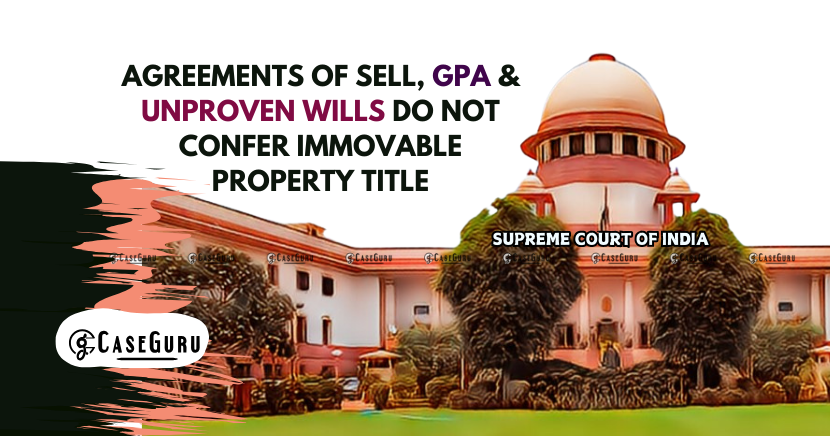
Agreements to Sell, GPAs, and Unproven Wills Do Not Confer Immovable Property Title: Supreme Court
Dismissing a suit for possession, the Supreme Court clarifies that only a registered sale deed transfers immovable property title, and further ruled that agreements to sell, General Power of Attorneys, and unproven Wills (especially with suspicious exclusions of heirs) do not convey ownership.
In Ramesh Chand (D) Thr. Lrs. vs. Suresh Chand and Anr., the Supreme Court set aside the judgments of the Delhi High Court and the trial court, and dismissed the plaintiff’s suit for possession. The Court reaffirmed the settled principles of property law relating to transfer of title through a Sale Deed or a legally valid Will.
The dispute involved two brothers, Ramesh Chand (Defendant No. 1/Appellant) and Suresh Chand (Plaintiff/Respondent No. 1), over property owned by their late father, Shri Kundan Lal. The plaintiff relied on a General Power of Attorney, Agreement to Sell, Affidavit, Receipt, and a registered Will — all executed in May 1996 — to claim ownership. The appellant, however, contended that the property had been orally transferred to him in 1973 and challenged the validity of his brother’s documents.
Both the trial court and the High Court had accepted the Plaintiff/Respondent No. 1’s claim and the Supreme Court, revisiting the matter, reiterated that an agreement to sell does not itself create ownership rights. The Apex Court held that at most, the Agreement of Sale gives the right to seek specific performance. A General Power of Attorney is only an instrument of agency and does not transfer title to immovable property. A valid sale requires a duly stamped and registered deed of conveyance, which was absent in this case.
Examining the validity of the "Will Deed" the Apex Court points to the requirements for proving a Will, as under Section 63 of the Succession Act and Section 68 of the Evidence Act, at least one attesting witness must be examined. The Registration alone cannot validate a Will, and the burden lies on the propounder to remove any suspicious circumstances. Here, the registered Will excluded three of the testator’s four children without any explanation, a factor that the plaintiff failed to address.
On the plea of part-performance under Section 53A of the Transfer of Property Act, the Apex Court held that this doctrine also could not apply to the case at hand and no benefits can be derived because the plaintiff was not in possession of the entire property when the suit was filed.
Concluding that none of the documents relied upon by the plaintiff conferred title, the Court held that succession opened to all Class-I heirs upon the death of Shri Kundan Lal, as the Will was unproven. The appeal was allowed, the plaintiff’s suit was dismissed, and the second defendant’s rights were protected to the extent of the appellant’s lawful share.
Coram: Justice Arvind Kumar and Justice Sandeep Mehta.



Comments